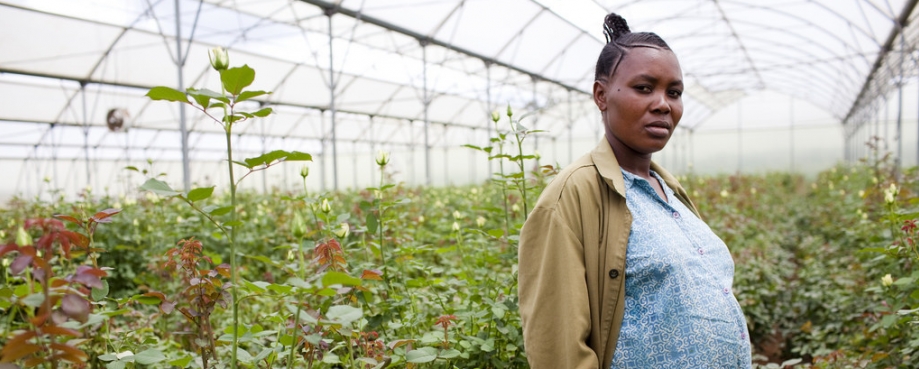
"I'm able to balance family responsibilities and work ok"
Miriam is due to give birth in a few days' time.
Working on a large rose farm near Arusha, Tanzania, she spends her working day picking roses in a greenhouse that's kept at a constant 34 degrees centigrade.
When I feel tired I can go and sit down in a cooler area.
"I'm used to the heat", she says. "When I feel tired I can go and sit down in a cooler area."
She is also allowed to go home two hours earlier than other workers, while remaining on the same pay.
"I'm able to balance family responsibilities and work ok."
At Miriam's farm, workers have organised themselves into a union - the Tanzanian Plantation and Agricultural Workers Union (TPAWU) - which has a collective bargaining agreement with the farm's owners.
The agreement enshrines maternity rights that go above and beyond legal requirements.
On top of providing statutory maternity leave of 84 days, provisions include giving light duties and fewer working hours on the same pay to women who are at least 6 months pregnant; the freedom to stop working 2.5 weeks before the due date; and light duties and fewer hours for 6 months after returning to work.
Not all flower farm workers are so lucky. Although horror stories of women giving birth in fields are fewer and further between, they still struggle to balance their need to earn an income with their roles as mothers and carers.
Research commissioned by ETI member NGO Women Working Worldwide found that across East Africa, women often lack access to adequate maternity benefits such as the right to take maternity leave, to take breaks to breast feed their babies, and to be given lighter work during pregnancy.
Retailers sourcing flowers from East Africa must insist that their flower suppliers protect women workers' maternity rights, and that they allow them to form trade unions - which, as TPAWU is demonstrating, provide a home-grown mechanism for women workers to bargain for their own rights.
